
views
X
Research source
Whether you’re having trouble filtering out the background noise of life, struggling with the temptation to text while you work, or fixating on a million worries, there are things you can do to improve your focus. We’ll talk you through a few simple strategies in this article.
Sip a small amount of caffeine.

Drink a cup of coffee or tea for a quick shot of energy. Sit down with your caffeinated beverage of choice when it’s time to focus on your task. It will help perk you up and improve your powers of concentration. Don’t overdo it, though! Drinking too much caffeine will make you jittery, and you’ll actually have a harder time focusing. Stick to no more than 300 mg of caffeine (the amount in about 3 typical cups of coffee) per day. For the best effects, drink it once a day, at the time you most need to boost your focus.
Eat an energizing snack.

Keep healthy snacks and water on hand while you work. It’s hard to focus when you’re feeling parched or your stomach is growling. Perk yourself up by sipping some cold water or nibbling on something nourishing. Some good snacks for boosting your energy and brain power include: Dark chocolate Almonds Apple slices with peanut butter Hummus Greek yogurt Fruit salad
Chew gum or eat a piece of candy.

The act of chewing increases blood flow to parts of your brain. Grab a stick of gum or a peppermint candy if you feel your focus slipping. You might find that having something to work on with your mouth makes it easier to concentrate. There’s not much hard data to back it up, but some scientists believe that the smell of peppermint can increase alertness and help you concentrate longer. Choose mint gum or candy for an extra shot of mental energy.
Grab a fidget spinner.
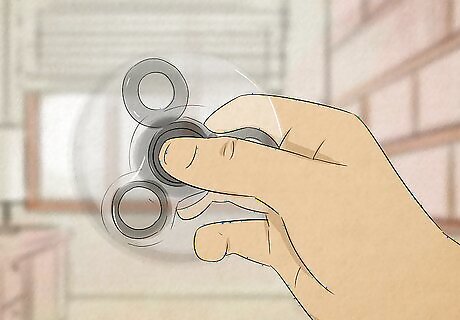
Fiddling with something makes it easier to concentrate. If you don’t have a fidget spinner, try a stress ball, some silly putty, or a ring of keys. Move it around in your hands while you work on your task. Other forms of movement can also help you concentrate. For instance, try sitting on a bouncy chair or even standing and doing light stretches while you work. It’s not clear why fidgets are so helpful. Scientists think the extra stimulation keeps your brain busy enough that your mind doesn’t wander as much during boring tasks.
Take a few deep breaths.

When you get distracted, gently redirect your attention. It’s totally normal for your mind to wander, even when you don’t have any outside distractions to get you off track. Next time it happens, stop and breathe in and out a few times. Focus on the sensations of your breath going in and out of your lungs. When you’re done, you might find that your mind is clearer and you’re ready to get back to your task. Practice noticing when your mind wanders. The quicker you are to notice it, the sooner you can get back to whatever you’re focusing on!
Eliminate outside distractions.
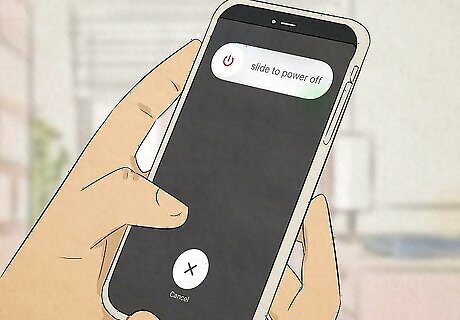
Put away your phone so you’re not tempted to play with it. Turn off notifications and put your devices in “Do Not Disturb” mode. If you can, find a place to work where you won’t be distracted by TV screens, loud noises, or other people moving around and talking. If you’re working on a computer or tablet, consider installing an app or browser extension that can block distracting websites or social media apps. For instance, try a productivity app like Freedom, or an extension like StayFocusd. Sometimes it can be hard to get away from distracting background noise. If you can’t find a quiet place to work, put on noise-canceling headphones and listen to white noise or quiet music.
Write down distracting thoughts.

Jotting things down can help clear your mind. If you keep getting distracted by something that’s worrying you, write it on a piece of paper or make a note in a document on your computer. Then you can turn your attention back to whatever it is once you’re done with your current task. For instance, if you’re worried that you’re going to forget about another task you need to do, write a reminder to yourself. If you’re feeling down about something, putting your feelings on paper can make them less overwhelming and distracting. For example, write something like, “I’m still mad about what happened in class yesterday!” Once you’ve done that, you might find it easier to let go and stop thinking about it. If you still can’t stop thinking about whatever is distracting you, take a brief break and move around to help clear your head.
Deal with urgent issues first.

If there are small tasks weighing on your mind, do those first. For instance, maybe there’s an urgent phone call you’ve been meaning to make. Take a minute to get it done before you sit down to your task. If it’s not hanging over you, you’ll find it much easier to concentrate! If you can’t tackle whatever is bothering you, look for some small thing you can do to make it feel less urgent. This could be as simple as writing down a time to take care of whatever you’re worried about in a planner.
Schedule a time to get your task done.
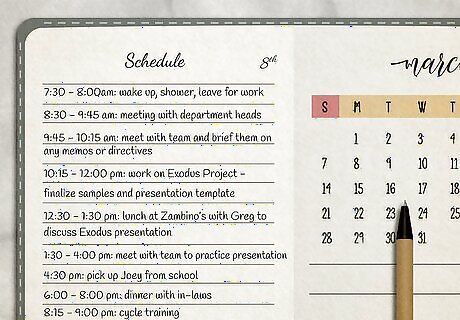
It’s easier to focus if your time is structured. Pick a time when you know you won’t be interrupted and when you’ll have enough time to finish your work. Set that time aside for just the one thing you want to focus on, so you won’t be tempted to multi-task. Set both a start time and an end time, since having a time limit can help you stay on track. For instance, you might block out half an hour after lunch to do your math homework. If you’re not able to finish your task in the amount of time you set for yourself, schedule a new time to complete your work—even if it’s just a little later the same day.
Look for a comfortable workspace.

It’s hard to focus if you’re uncomfortable. If you can, find a quiet area with plenty of space to spread out. Make sure the area is well-lit and not too hot or cold. Try to choose a spot where you can close the door so you’re less likely to be disturbed. Try not to pick a spot that’s too comfortable (like your bed or a really cozy couch), or you might be tempted to fall asleep. Experiment with the type of environment that works best for you. For instance, some people actually concentrate better in a place with quiet background noise, like a coffee shop or public park. It’s not always possible to find a good place to work, but you can do things to make your space more comfortable. For example, add a cushion to your chair, put up a privacy screen at your desk, or grab a blanket if you’re too cold.
Break up big tasks into smaller pieces.
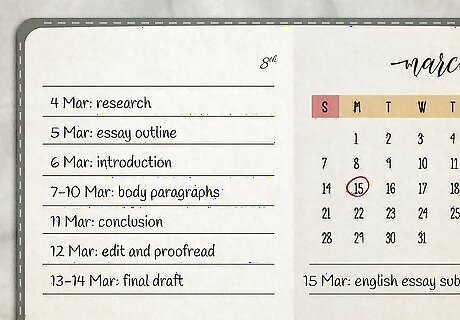
A big, complicated task can feel overwhelming. Instead of trying to focus on the whole thing at once, split it up into bite-sized pieces. Concentrate on getting each piece done before moving on to the next one. For instance, if you’re writing an essay, start with the outline. From there, go on to writing the introduction, drafting the main body of the essay, writing the conclusion, and proofreading your work. Think of each of those steps as a separate task.
Take frequent breaks.

Trying to focus for too long is counterproductive. Instead of trying to tough it and focus for hours on end, get up about once an hour—or any time you start feeling bored and restless—and do something else. Once your brain has had a chance to rest, you’ll find it much easier to concentrate! Try doing things like: Standing up and stretching Going for a brief walk Eating a light snack Putting your head down for a 10 to 15-minute snooze
Get a good night’s sleep.
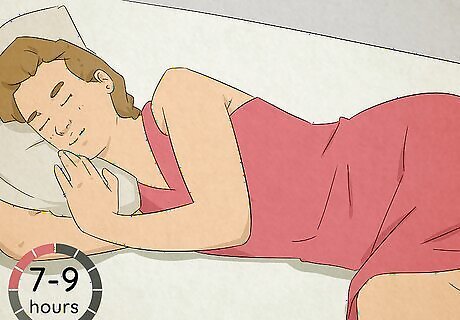
It’s really hard to focus when you’re tired. If you’re having a hard time getting anything done, aim to get a full 7-9 hours of sleep before trying again. Plan to go to bed early enough so that you can wake up refreshed and ready to get things done. To ensure that you get a good night’s sleep, put away all devices with bright screens at least half an hour before bedtime. Keep your room dark, quiet, and comfortable at night. If you have trouble falling asleep, try a relaxing bedtime routine. Do some light stretches, read a relaxing book, or take a warm bath or shower before you go to bed. Talk to your doctor if you regularly have trouble sleeping or always feel tired, even after a full night’s sleep. They can help you figure out what the underlying problem is and offer advice about how to sleep better.
Do stress-relieving exercises.

Letting go of stress will improve your concentration. If your mind is crowded with worries, take a few minutes to unwind before you try to focus on anything. Spend a few minutes meditating, doing some gentle yoga, or going for a peaceful walk outside. Try to focus on what’s happening in the moment instead of whatever it is that’s bothering you. You can also do other activities that you find relaxing, like having a talk with a friend, doodling in a sketchbook, or reading.
Practice mindful meditation.

Mindfulness helps you sharpen your powers of concentration. If you’re new to meditating, look for guided meditations online or sign up for a class. Try to set aside just a few minutes every day—even if it’s just 5-10 minutes at first—to practice mindfulness. These exercises will help you become more aware of when your mind is wandering so that you can get your thoughts back on track faster. It takes time, but you’ll find your focus improving with daily practice! To do a simple mindful meditation exercise, find a quiet place to sit or lie down. Start by focusing on the sensations of your breathing for a few minutes. Then, turn your attention to something specific that you’d like to concentrate on, like a particular sound or sensation. As you meditate, try to notice when your mind wanders. It’s totally okay if this happens—the important thing is that you notice it! When you get distracted, gently turn your attention back to whatever you were focusing on. When you’re done, guide your attention back to your breath for a few moments before ending the meditation.




















Comments
0 comment